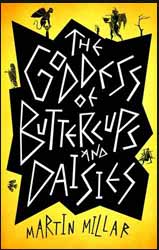|
Click here to return to the main site. Book Review
For ten years the war between Athens and Sparta has dragged on, bringing both cities to the brink of destruction. The public want peace, but there are powerful factions in Athens intent on carrying on the war. The sides are evenly matched and it would not take much to turn the city away from war. Fretting about trying to get his play completed, Aristophanes, struggles through a lack of money and floppy fake phalluses to complete his play Peace. The Goddess Athena feels that this could be the tipping point the Athenians need and so sends the Amazonian Bremusa to counter the negative effect of the demi-Goddess Laet, who is seeding discontent amongst the citizens... The Goddess of Buttercups and Daisies (2015. 188 Pages) is another satirical flight of Pythonesque fantasy from Martin Millar. The story is set in ancient Greece, 421 BC, and takes the view that all the elements of Greek myth exists, so we have everything available between Gods and man. The writing style is comically witty, using everything from clever puns to nob jokes, which if the book is to believed have never really gone out of fashion. We follow the exploits of Aristophanes as he tries to ready his comedic play for an important festival. This becomes the central event around which all the other subplots orbit. The bane of his life is Luxos (who appeared in the earlier book Lux the Poet), a young struggling poet, who looks to Aristophanes for patronage, as they belong to the same Athenian tribe. At the beginning of the book Luxos is a bit of a buffoon, completely convinced that he is destined to be a great poet, even though not one single Athenian will give him a chance. His character changes when he meets the nymph Mertris, who has accompanied Bremusa to the city in order to ensure the successful completion of the peace talks. Bremusa has her own problems when she discovers that Idomeneus is in the employ of Laet, these two last met in battle at Troy, both having been rescued only to meet again seven hundred years later with their feud still intact. The book contain no chapters, but each section of writing is headed with a character’s name as the plot jumps shifting perspective around the city trying to keep all the threads together aiming for the all important Dionysia festival. The book is expertly layered, on top you have what could be seen as traditional farce, yet underneath this is also a wonderful critique of our own state of affairs. The Athenians engage in a fictional democracy, fictional because the really important decisions are being made by the rich and powerful minority. Luxos represents a good example of how a meritocracy tends to work; he cannot get a hearing as a poet, not because he is no good, although as a reader you suspect that this is the case, but because of his family’s poor background. I did like that most of the characters were quirky in their own way, but not so much as to make them into caricatures. The comparison to Kurt Vonnegut is apt as both novelists are able to combine levity with profundity, creating a book which is light to read, but full of deep thought. 8 Charles Packer Buy this item online
|
|---|

